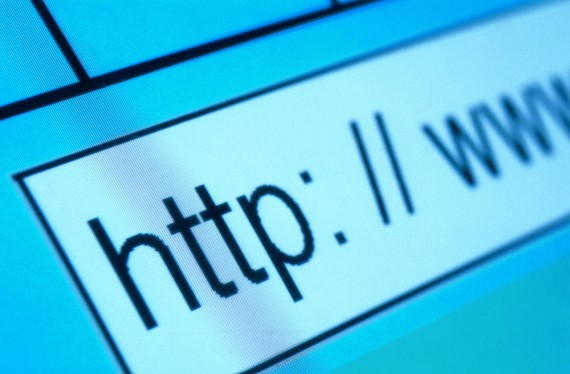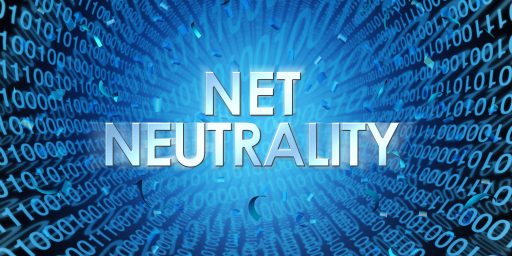No, Net Neutrality Is Not A Government Takeover Of The Internet
Contrary to current conservative talking points, Net Neutrality is not a nefarious government scheme to takeover the Internet, but is aimed to address a real problem. Like most ideas that involve the government, though, it doesn't really address the real source of the problem; not enough freedom
Much of the reaction, especially on the right, to the F.C.C.’s Net Neutrality regulations has been rather overheated. Michelle Malkin, for example, is among those asserting that the regulations representing the beginning of a left-wing power grab, while another conservative blogger likened it to Hugo Chavez’s recent assumption of yet more dictatorial powers. Both of these are far off the mark. There are, as I said yesterday, legitimate concerns about the future development of the Internet. that the F.C.C. policy aims, mistakenly I think and without proper legal authority, to address, and it’s worth giving this issue fair consideration rather than just throwing it into the same ideological box that every other issue gets tossed into these days.
To do that, though, we first need to do away with the inflammatory rhetoric that is typical of modern politics, and realize what this debate is really about:
Post NBC-Comcast merger, Comcast would still be one of the largest internet providers in the US, and would now also control a respected, though politically suspect, news organization. Now, if NBC wanted to strengthen its presence on the web and further advance their leftist agenda, they could just call up their bosses at Comcast and say “Hey Jim, we’re rolling out a new video heavy site next week at MSNBC and want it to go well. Do you mind prioritizing the traffic for our site and cutting back the bandwidth that serves Fox News’ content? That way we’d have a good quater and all get bonuses.” And just like that, the internet is no longer a fair, equitable battleground, and the voices of conservatives would be muted. Taking this example one step further, Comcast could also provide NBC/MSNBC content for “free” with basic internet service, but if you want access to Fox News you have to pay an extra $5 a month. Net Neutrality would also prevent this from happening
(…)
The main argument from the right has been that the government is seeking to regulate something where there is no problem, but there have been many indicators from corporations and the FCC themselves that both examples I used, prioritization and pay for content, are business models that are seriously being considered sooner rather than later. Net Neutrality is as important to free speech as the Citizens United SCOTUS ruling was, and conservatives that want to remain in a position where their voice is heard over the internet should be applauding it. If right leaning activists want the GOP to be taken seriously going into 2012, we all need to start understanding the issues and the realistic policy outcomes from taking action, on inaction, and formulating our responses accordingly. In this case, the temper tantrum is unwarranted and unproductive.
It’s also important to understand what Net Neutrality is really all about and, as one conservative blogger points out, Net Neutrality is about finding a way to resolve the conflicts that arise between the provider of a finite resource (the ISP) and the users of that resource:
I understand the Conservative impulse to say “well, I don’t want to have to pay for utility I don’t use.” Well, then. You shouldn’t be paying for cable TV, because it follows the same cost-spreading principle. A similar gripe is that we are paying for the usage of others. In some circles, that’s a problem, and I have no problem with data usage tiers and caps. I have no problem with charging heavy users more money. The huge problem is in the ISP telling you that they are charging you more money for using a service or protocol, for any reason, including excessive bandwidth use. This may sound like splitting hairs, but there is a world of difference. In the second model, the ISP tells you what costs more money. Do you like watching streaming football games? What if they told you that accessing that site costs extra, but if you buy their TV package they’ll throw that first year of NFL coverage for free and then charge you more money next year?
(…)
The ISP agrees to serve you the data at (almost) the speed they advertise, and to give you the capacity they say they do. They let you access the Internet, wherever on it you may go, using whatever protocols you have available (which includes FTPing to your web server, and yes, even seeding that copy of Ubuntu or something less legal). The core idea behind Net Neutrality is that data is data. Cut through all the commetary and the FUD, the anti-socialistic rants from Conservatives and utopian appeals by Liberals, and the issue isn’t really all that difficult to understand: who decides what you get for what you pay for?
As a libertarian, my response would be that it should be the individual choices of consumers, as reflected in the free operation of the marketplace that makes that choice. The problem we have right now, though, is that we really don’t have a free market in broadband in this country. For most Americans, broadband internet services are provided by Cable Television companies and, with few exceptions, that service is provided by a local monopoly who obtained the right to run cable throughout a given community from the government. Furthermore, while there are alternatives to Cable television services — such as Direct TV and Dish Network — there are only a few parts of the country where there is a viable alternative to the high-speed internet service provided by, say, Comcast or Cox.
What that means is that, absent intervening regulations, a Comcast customer who wakes up one morning and discovers that Comcast-NBC is providing preferential access to its content has few options but to accept what has happened. If there were more competition in the provision of high-speed internet access, he would be able to switch providers and the fact that he could do so would make it less likely that ISPs would provide favorable access in this manner. Because there isn’t, thanks largely to those locally protected monopolies, and our Comcast customer is at the mercy of his provider. That’s the kind of situation that Net Neutrality is meant to prevent.
The FCC’s regulations are still flawed, of course, as Larry Downes notes in a must-read column at C-Net:
When all is said and done, the real problem with Net neutrality advocacy is that it tries to preserve the Internet as it looked in the mid-1990s–the wild open frontier that captivated so many of us, that inspired the first generation of e-commerce and informational Web sites, and that launched the great Internet bubble and the stock market’s “irrational exuberance” that burst in April 2000, the day a federal judge first ruled that Microsoft’s browser dominance violated federal antitrust law
Despite the stock market crash and doldrums that followed, the Internet has continued to evolve, expand, and develop new and exciting uses since then. Access speeds accelerate, new software and new applications continue to enter the bloodstream of the Web, and millions of new users have joined in. The Internet is now a worldwide phenomenon, and a continued source of awe and wonder.
Even without the FCC’s help–or perhaps because of its absence–the ashes of the dot-com flame-out have been cleared by social networking, the mobile Internet, and other so-called Web 2.0 applications, including Facebook, Twitter, the iPhone, Android, and the rest.
But to hear the Net neutrality advocates talk, it’s still 1999, and the question is whether Yahoo or Alta Vista is the better search engine (Google hadn’t yet been invented), or if a 9600 baud modem is fast enough. That was an Internet that didn’t include, among others, content delivery networks, voice over Internet Protocol telephony, video services, caching, or co-located servers.
That’s the real risk of regulating anything having to do with the Internet, or any disruptive technology. Regulation is necessarily static, inflexible, and vague. Rulemaking and adjudication are divorced from technical realities, and they are necessarily political.
Which is why the real answer to the issues outlined above isn’t more regulation, but more freedom. If consumers had more choices regarding internet access then the danger of service providers who have merged with content providers blocking access in ways that are to their advantage would be limited to non-existent. Additionally, competition would create the incentive for providers to create faster, better, more reliable internet services. More importantly, though, competing service providers would be far better equipped to react and adapt to changes in technology than a regulatory structure built by a Commission of bureaucrats whose authorizing statute is approaching its 100th birthday.It wouldn’t be any easy change to make, mostly because neither the FCC nor Congress have (or should have) the legal authority to bring an end to local cable monopolies, but it’s a goal that worth shooting for.







If there were more competition in the provision of high-speed internet access, he would be able to switch providers and the fact that he could do so would make it less likely that ISPs would provide favorable access in this manner. Because there isn’t, thanks largely to those locally protected monopolies, and our Comcast customer is at the mercy of his provider. That’s the kind of situation that Net Neutrality is meant to prevent.
So we need the government to intervene on our behalf because of a monopolistic system that came about because of the government.
Terrific.
Good write up.
My rule would be that local governments may offer monopolies of up to 10 years to “first provider” as inducement, but after that should consider tenders from secondary providers on their own merits.
So (since 10 years is up) my city could get an offer from Foo Corp to wire us all with fiber, if the city floats a bond. Bad deal, reject it. Then say Verizon says that they have fiber in the next town up the coast, and are willing to throw some bits our way at their cost. Good deal, take it. etc.
I think you are wrong about most areas being monopolies for internet service these days. In St. Louis there are AT&T and Charter for cable internet, multiple providers for DSL, and HughesNet and DirecTV for satellite internet. I’ve never regarded St. Louis as anywhere near the forefront of infrastructure technology.
I find it weirdly ironic that you say that neither the FCC nor Congress has the authority to end cable monopoloies, but don’t seem to mind that the FCC just usurped monopolistic authority over ISPs out of thin air. For our own good, of course.
Charles, I believe there was some kind of deal cut for cable “deregulation” that sid one cable co, one phone co, and then the satellites.
I think that’s insufficient & the two land access companies don’t need to compete that hard.
Charles Austin : Congrats you’ve found one city where you have options. Meanwhile in Chicago the northside is comcast or dial up while the south side is charter or dial up. Satellite internet suffers from severe latency problems low speeds and weather related connection issues (it’s more sensitive then just regular satellite tv). DSL isn’t too bad but it lags severely behind cable in performance. In my current city I have one option where I live now. My current option isn’t available in all the city though as certain areas are blocked off for Time warner or charter only etc. Part of the problem I’ve been having with finding a new place to live is finding a location that is serviced by my current provider (local company that makes timewarner and comcast look like the pieces of shit companies they are).
I’m not so sure. What if Comcast, for example, decided that they’d rather have their content only available to people using their ISP?
Jay: So we need the government to intervene on our behalf because of a monopolistic system that came about because of the government.
Cable and phone services are natural monopolies unless you want all of the cable run by several different companies. The only alternative is for the cables to be run as public utilities, in which case the government itself owns and runs the infrastructure. I might find this preferable… but would you? You could also have an independent company owning and maintaining the infrastructure, but then you’re back to monopoly (only one per area) and regulation (to maintain their independence).
Notably, this is why they’re giving the cell phone companies a pass. That’s one area where you typically have four (sometimes more and occasionally less) options. Personally, I’m torn between an intense mistrust of the cell phone companies, but also recognizing that they at least do have to compete in a way that the local cable company does not. this exists because we have four overlapping cross-country networks. That’s a lot of redundancy. It has its benefits, but is generally inferior to the European model without the redundancy and with better coverage. That’s government regulation rearing its ugly head, though.
Charles Austin: I’ve never regarded St. Louis as anywhere near the forefront of infrastructure technology.
They seem to be in this case. I’ve lived in five places over the last 8 years and in each case, we’ve had one cable Internet provider and one DSL provider. There were sometimes different providers within the city, but they all had geographic monopolies within it. The only competing for my business I have ever had is the one cable provider, the one DSL provider, the satellite providers, and more recently the cell phone companies (when they’re not the same people selling you DSL). The last two, however, are substantively different from the first two and only sorta-count (cell phone companies having strict bandwidth-use limits but mobility and satellite generally sucking).
Matt: I’m not so sure. What if Comcast, for example, decided that they’d rather have their content only available to people using their ISP?
Then people whom Comcast does not serve would be crying bloody murder. They could, of course, require that TW pay them for the privilege. But hitting up ISP’s to deliver content is nothing new. ESPN has been doing it for years.
It’s also what AOL did at first, with a lot of exclusive content. However, the content providers found it worthwhile to shift their stuff over to the WWW.
Sorry, that last one was for Brett, not Matt.
Trumwill, while it would be silly to have competing water pipes brought up to each house, a bit of coax or fiber seems no big deal.
Heck, if it was a “natural” monopoly in the sense you claim, there never would have been cable companies. – the telcos would have owned it.
Oh! Also consider the situation I’m in. My city has coax-based TV and internet. The next city over has fiber. That fiber can’t come in because of my city’s monopoly (which you’ve called ‘natural’).
I don’t think its at all natural that coax in place means fiber is “redundant!”
while it would be silly to have competing water pipes brought up to each house, a bit of coax or fiber seems no big deal.
Well, I’m certainly not opposed to giving it a go, but I’m relatively skeptical that companies that haven’t laid wires would really be able to compete with those that already laid the wires. For the same reason that I would not invest in any new cell phone company that does not yet own any towers. In some ways I feel that we are lucky to have four cell phone companies (and we probably wouldn’t, had we not started out with dozens already overlapping)
On the other hand, I suppose it (back to the Internet) could be done if the new entrant has something unique to offer with newer technology and whatnot. So I guess I could be wrong.
“More importantly, though, competing service providers would be far better equipped to react and adapt to changes in technology than a regulatory structure built by a Commission of bureaucrats whose authorizing statute is approaching its 100th birthday.”
Well, the regulatory structure is only about 14 years old…but okay, minor point.
Considering that “competing service providers” didn’t exist prior to 1984 (when the Bell system was broken up) and has only accelerated since 1996 (when the Telecom Act was passed), I think smart regulations have their place. Emphasis on smart.
The truth is that “competition” like this is often an illusion. Charter and AT&T are competing on a real level, since they have separate networks. But AT&T is legally required to allow access to their network to all these little companies that don’t have networks or companies that are still in the process of building their networks. Your bill may say Mom and Pop DSL Company, but your internet traffic is still going down AT&T’s pipe. That’s not competition.
That’s accounting.
Matt, your problems getting access to more providers in Chicago are caused by the local government handing out monopolies and living off the grat. And your solution to this is more government monopolies?
I was catching up with an old friend recently, and she was very concerned about the net neutrality issue, quite worked up about it actually. Going on and on about how net neutrality was an attempt by the government to take over the internet and clamp down on political discourse because “Obama can’t take criticism.”
When I told here I found that amazing and asked where she got her information, the reply was “I have been watching Fox News a lot.”
“I have been watching Fox News a lot.”
It is so freaking sad that the conservative political machine (as opposed to genuine conservatives) plays this blatant “big lie” thing on net neutrality.
A real conservative would blow out the government granted monopolies. The conservative political machine is about protecting large corporate interests, who own those government monopolies.
“Matt, your problems getting access to more providers in Chicago are caused by the local government handing out monopolies and living off the grat. And your solution to this is more government monopolies?”
Obviously you cannot be bothered to even read my posts…
And there it is, gang.
And no, the internet is not a finite resource assuming governmental regulations are not in place prohibiting it’s growth to respond to needs. Of course that concept seems to slip right by some.
Sorry, I don’t buy it.
While there may be few options at the moment do you really suppose that other options will not quickly surface in such an instance?
Eric, your local government blocks physical access to cable/fiber with its monopoly and your national government blocks access to wireless spectrum through its monopoly.
What is supposed to “surface?”
Note that what I asked for above was for local governments to grant cable/fiber access to secondary providers, to make more of a market. Right now they do not.